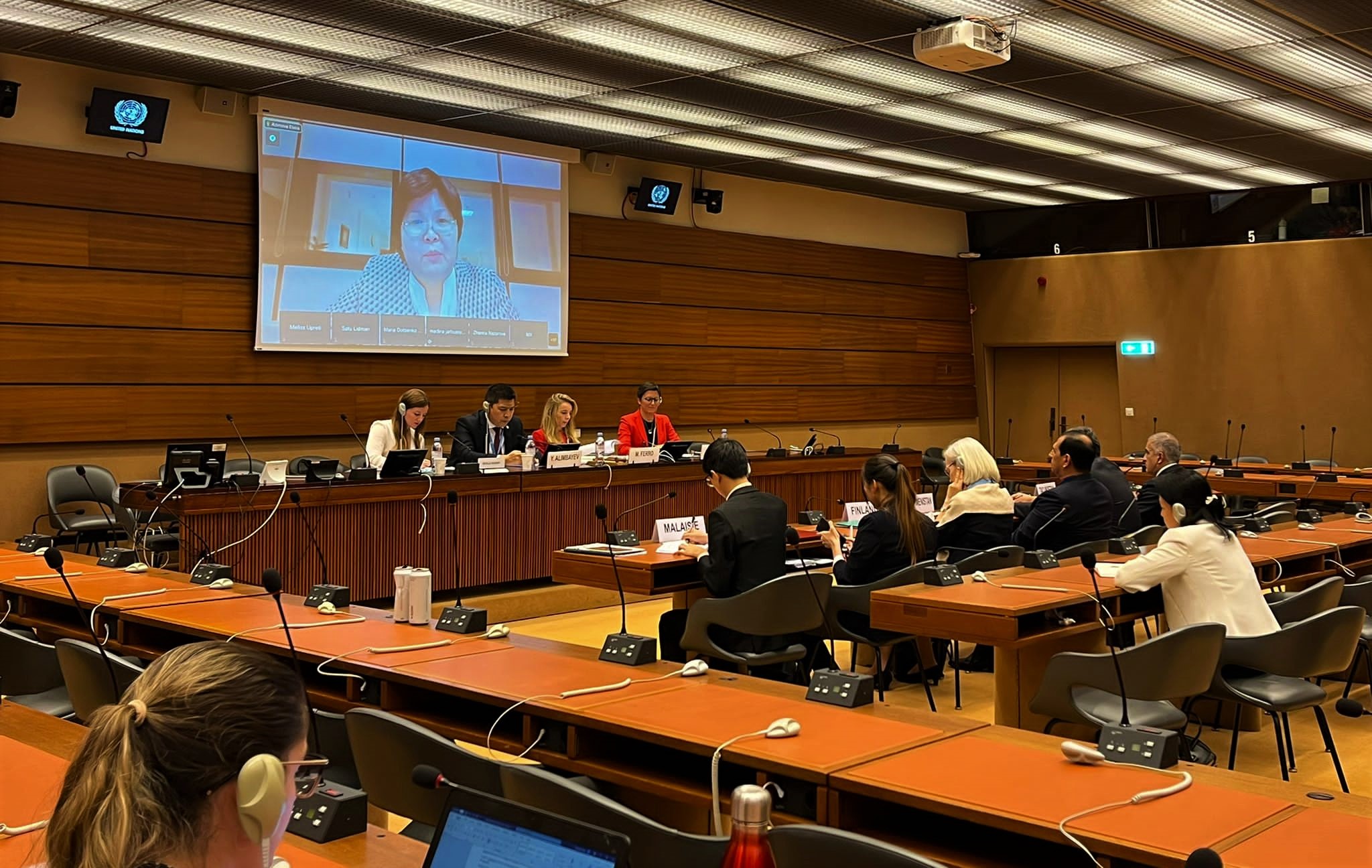Practice has shown low effectiveness of prevention and suppression of domestic violence – Ombudsman

On September 26, 2022, a hybrid event was held on «Women and Girls at Risk. Addressing Root Causes of Domestic Violence and Supporting Victims» on the sidelines of the 51st session of the Human Rights Council session, organized at the initiative of the Permanent Representative of Kazakhstan to the UN Office in Geneva and Human Rights Ombudsman Elvira Azimova.
Yerlan ALIMBAEV, Permanent Representative of Kazakhstan to the UN Office in Geneva, welcomed the participants. He noted that every woman has the right to live without violence. This is confirmed by international agreements, such as the Convention on the Elimination of All Forms of Discrimination against Women and the 1993 UN Declaration on the Elimination of Violence against Women, as well as other internationally agreed norms and standards.
The World Health Organization estimates that 1 in 3 all women experience domestic violence at some point in their lives. Much of this violence is intimate partner violence. Globally, nearly a third (27%) of women aged 15-49 in relationships report experiencing some form of physical and/or sexual violence at the hands of their intimate partner. Domestic violence occurs in all countries, regardless of the class, race, or education level of the individuals involved. Measures to prevent domestic violence must address the root causes and combine support for victims with preventive and legal measures.
Aуman Umarova spoke about her new project, "Women, Children, Prisons," which is supported by the National Commission on Women and Family and Demographic Policy under the President of Kazakhstan. "Women and their empowerment, peace and justice remain relevant goals of the Global Sustainable Development Agenda (SDGs). I believe that women prisoners who are victims of violence should not be excluded from this Agenda. Many of them continue to be mothers to their children. Their children grow up without maternal affection and care", A.Umarova noted.
The lawyer invited UN bodies and institutions and partners from Central Asia to support the project within the region, in order to share experiences in combating violence against women and children, especially the practice of law.
«The analysis of crimes and their recurrence shows the continuation of violence in families. Unfortunately, the applied institute of protection and prevention does not provide complete safety of the victim», – says Elvira Azimova, the Commissioner for Human Rights in the Republic of Kazakhstan.
According to the Ombudsman, despite the comprehensive legislative regulation of measures, the two-year practice shows their low effectiveness.
According to law enforcement authorities, only for 8 months of this year 590 crimes were committed in the family and domestic sphere, and for the same period of 2021 their number was 636.
Analysis shows that 80% of offenses were related to the use of alcoholic beverages, narcotics and psychotropic substances.
More often than not the victim with children went to relatives, to crisis centers, which is against the interests of children and burdens the family.
As the Ombudsman noted, court practice demonstrates that sources of conflict remain without police and court attention, thereby reinforcing the sense of impunity of the "aggressor" and the "powerlessness" of the victim.
From 45 to 71% of cases of intentional violence in the family and domestic sphere are terminated due to reconciliation of the parties and from 60 to 71% of cases the perpetrators are given a warning.
Azimova believes that the existing system of registration of such violations does not allow to eliminate the majority of family and domestic conflicts from the latent character and to separate the facts of high, medium and low degree violence.
In this regard, she reported on the measures initiated by the Ministry of Internal Affairs of the Republic of Kazakhstan to introduce service police and reform the system of registering reports of violations. The introduction of a system of evaluation of reports based on clear indicators, according to the Kazakh Ombudsman, will allow to focus the attention of law enforcement officials on dangerous facts of violence, and it does not matter whether there is a statement from the victim or not. Police have the right to receive reports from any person. In cases of low risk, it is possible to launch a mechanism of prompt referral to social services and non-governmental organizations, which will help and counsel families with children who find themselves in difficult situations.
The Ombudsman also noted the need to strengthen partnership work with civil society organizations to raise public awareness about the risks of violence and measures to prevent it, to develop economic opportunities and skills of women, the introduction of digital technologies into the registration and analytical work of the police, the involvement of psychologists, teachers and sociologists, specialists in the field of culture.
The speakers were Estelle Wagner (International Planned Parenthood Federation), Melissa UPRETI, (Chair of the UN Working Group on Discrimination against Women and Girls), Satu LIDMAN (PhD, Adjunct Professor, University of Turku, Finland), Aуman UMAROVA, (Kazakhstani lawyer, member of the Kazakhstani National Commission on Women and Family and Demographic Policy under the President of the Republic of Kazakhstan), Anna PARINI (UN Women Liaison Office in Geneva, Monica FERRO (Director of the UN Population Fund Office in Geneva).
The event was also attended by Askhat Azirbekov, Head of the Office of the Akyikatchy (Ombudsman) of the Kyrgyz Republic; Maria Dotsenko, Head of the UN Women Office in Kazakhstan; Khalida Azhigulova, member of the Public Council under the Ministry of Interior of the RK, Doctor of Law (PhD), Director of the Center for Human Rights, Inclusion and Civil Society Studies at the Eurasian University of Technology; Zhanna Nazarova, Head of the Penal Reform International office in Central Asia; Madina Jarbussynova, UN Women National Consultant and UNDP project representatives in Kazakhstan.
#Ombudsman #ПраваЧеловека #HumanRights